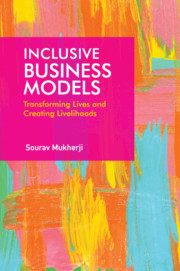Book contents
- Frontmatter
- Dedication
- Contents
- List of Tables
- List of Figures
- Preface
- Acknowledgements
- 1 Introduction
- 2 Vaatsalya Hospitals: Affordable Healthcare in Proximity
- 3 Gyan Shala: Providing Inclusive Education
- 4 Rang De: Creating a Platform for Social Investing
- 5 Labournet: Empowering Informal Sector Labourers
- 6 Selco: Inclusive Model for Energy Access
- 7 Hasiru Dala Innovations: Improving Lives of Waste Pickers
- 8 Reliance Retail: Creating Inclusive Supply Chain
- 9 International Development Enterprise (Ide) Nepal: Developing Smallholder Ecosystem
- 10 Ruralshores: Delivering Inclusive Service
- 11 Gujarat Narmada Fertilizer Company’s (Gnfc) Neem Initiative: A Social Business
- 12 Bringing it All Together
- References
- Index
5 - Labournet: Empowering Informal Sector Labourers
Published online by Cambridge University Press: 31 July 2021
- Frontmatter
- Dedication
- Contents
- List of Tables
- List of Figures
- Preface
- Acknowledgements
- 1 Introduction
- 2 Vaatsalya Hospitals: Affordable Healthcare in Proximity
- 3 Gyan Shala: Providing Inclusive Education
- 4 Rang De: Creating a Platform for Social Investing
- 5 Labournet: Empowering Informal Sector Labourers
- 6 Selco: Inclusive Model for Energy Access
- 7 Hasiru Dala Innovations: Improving Lives of Waste Pickers
- 8 Reliance Retail: Creating Inclusive Supply Chain
- 9 International Development Enterprise (Ide) Nepal: Developing Smallholder Ecosystem
- 10 Ruralshores: Delivering Inclusive Service
- 11 Gujarat Narmada Fertilizer Company’s (Gnfc) Neem Initiative: A Social Business
- 12 Bringing it All Together
- References
- Index
Summary
Close to 90 per cent of India's working population belongs to the unorganized sector, people who are typically poor, consumption deprived and socially vulnerable. During the last two decades, even while the number of people below the official poverty line has reduced, the number of people consuming less than INR 30 per day has increased within the informal sector. A majority of people working in the informal sector are rural migrants who come to the city in search of livelihood because of dwindling opportunities in the villages. India's sprawling cities are able to absorb many of them because of the booming construction sector as well as an increasing tendency among Indian corporations to outsource their non-core activities. However, in the cities, the migrant labourers face hostile conditions and the wages they receive are grossly inadequate to make ends meet. Thus, if India wants to solve its poverty and inequality problem, it needs to squarely address the needs of informal sector workers. LabourNet, a for-profit social enterprise, is trying to address these needs. M. Gayathri, the Managing Director of LabourNet, noted,
Even though cities attract them in large numbers, cities do not assimilate the poor migrant labourer. Arriving from the villages, they do not have any place to stay, do not get the kind of food that they were used to. Without an identity, they are unable to prove their BPL status. Thus, they may be living in the cities for fifteen years, yet they do not belong to the cities, being always at the receiving end of its hostilities and exploitation. One needs to think about catering to some of their fundamental needs that would enable them to survive the harsh realities of cities. This is what LabourNet intends to do.
ORIGIN AND EARLY DAYS
The roots of LabourNet lay in MAYA (Movement for Alternatives and Youth Awareness), a Bengaluru-based NGO founded in 1989 with the intention of dealing with the problem of child labour. MAYA wanted to send children working in the streets back to school and its founders along with volunteers spent the next several years spreading awareness among children, youth and communities about the evils of child labour and enrolled working and street children into non-formal education schools.
- Type
- Chapter
- Information
- Inclusive Business ModelsTransforming Lives and Creating Livelihoods, pp. 103 - 127Publisher: Cambridge University PressPrint publication year: 2021



